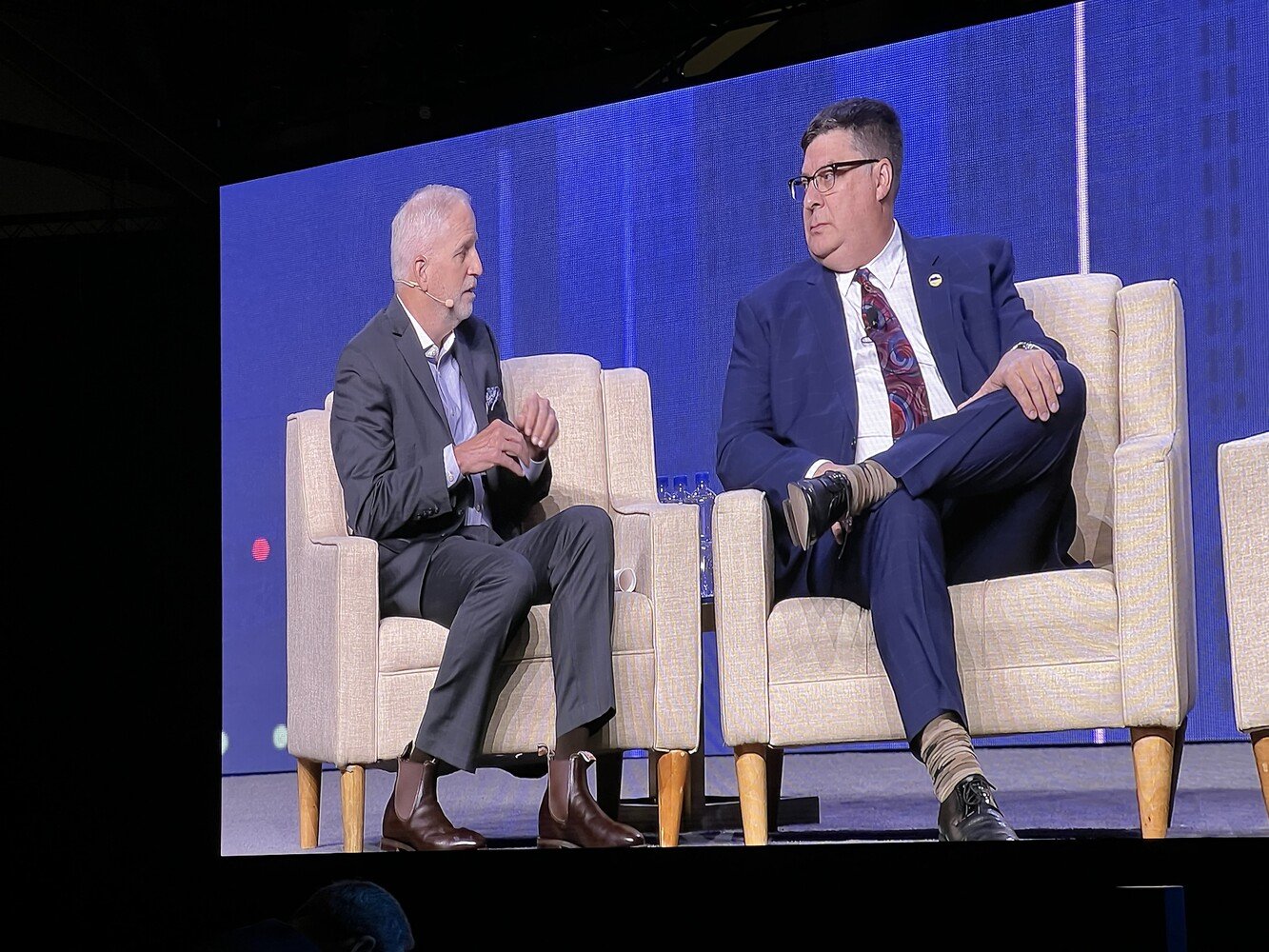ESRI LOCATES IN EMERGING NEW DOWNTOWN DISTRICT AT GLOBE BLDG.
Global mapping and locational intelligence leader Esri is locating in St. Louis' Downtown North Insight District.
Written by Dick Fleming | Originally Published in Geospatial World Magazine
"There is really no place in the United States or the world that has the enthusiasm, dedication, and interest in developing a geospatial community than St. Louis.," noted Patty Mims, Director for National Government at Esri, in an interview with St. Louis' National Public Radio affiliate, STPR, during the 4-day U.S. Geospatial Intelligence Foundation (USGIF) Annual Symposium recently convened in St. Louis.
Esri's Patty Mims interviews with St. Louis NPR affilate regarding Esri locating in The Globe Building.
The Redlands, California-based global mapping and locational intelligence firm announced during the USGIF 20th Annual Symposium that they would be locating in The Globe Building in downtown St. Louis.
She further told the St. Louis Post-Dispatch, “a lot of synergy is coming together in The Globe Building,”
Mims was announcing that Esri would be the latest Geospatial Intelligence firm to locate its offices in St. Louis’ newest innovation district – the Downtown North Insight District: https://downtownnorthstl.com/
The Globe’s and the District’s proximity to the new NGA-St. Louis HQ campus (opening in the first quarter of 2026) are unique locational advantages, and have already helped lure other top geospatial companies to locate at The Globe in downtown St. Louis – firms such as General Dynamics, MAXAR, Ball Aerospace, and the U.S. HQ of Sweden-based T-Kartor have each “planted their flags” in the high-tech renovation of the 720,000 square foot Art Deco Globe Building.
Complementing these Geospatial Intelligence firms, Westway Enterprises, LLC, also recently opened a 75,000 square foot multi-tenant SCIF in The Globe Building as well. The new SCIF is just one of three such facilities in the U.S. (the other two being in the Washington, D.C. area).
NGA Director,Vice Admiral Frank Whitworth, underscores St. Louis GEOINT role.
Among the 4,000 public and private sector leaders participating in the USGIF “From Maps to Metaverse” Symposium was NGA Director Vice Admiral Frank D. Whitworth, who took the occasion to formally name the 100-acre, $1.75-billion, 3,100-job National Geospatial-Intelligence Agency (NGA) new HQ “NGA –St. Louis.”
In his opening keynote address to Symposium participants, Admiral Whitworth observed, “St. Louis is the place to be if you want to position yourself at the future of GEOINT.”
St. Louis Public Radio carried an online headline summarizing the NGA Director’s keynote address, which clearly reflected the Admiral’s declaration; namely, “St. Louis’ New Geospatial Identity Is Emerging, And People Across The Country Are Noticing.”
The new center city NGA HQ campus is just blocks from the Downtown North Insight District, which in addition to The Globe Building, also includes The Post Building, a 226,000 square foot high-tech artful renovation of the former St. Louis Post-Dispatch HQ; along with the GEOINT incubator and NGA Moon Shot Labs at T-Rex; and the 572,000 square foot America’s Center Convention Center (the location for the USGIF Symposia in 2021, 2023, and 2025).
Because of its sophisticated technology features, The Globe Building has been dubbed a “High Tech Castle” and, as the “Location of Choice for Geospatial and Other Tech Firms” because of the high-tech adaptive renovation of this former major rail- road station, which ironically once also served as one of NGA’s predecessors during World War II, housing a staff of over 500 map makers for the U.S. Aeronautical Chart Plant facility.
Former NGA Director, now USGIF Chair Robert Cardillo with GEOINT investor/advisor Keith Masback.
Regarding the continuing evolution of St. Louis in Geospatial Intelligence, GEOINT leader Keith Masback, the decade-long CEO of USGIF, now an angel investor and international geospatial advisor posited, “At the very heart of the origin of the term ‘geospatial intelligence’ was a vision to achieve powerful synergies by combining remote sensing, geospatial data and information, data analysis, and data visualization.”
Masback concluded, “In St. Louis, this has been realized at The Globe Building, and Esri will both contribute in an impactful way and benefit significantly by joining the community in The Globe Building.”
In this regard, Esri’s Mims observed, “Having all those companies in the same building, the hallway conversations, the lunches, the impromptu meetings, as well as the formal meetings we’ll be putting together is just another way of building that community.”
Fellow developers of The Globe Building (Steve Stone) and The Post (John Berglund), at USGIF Symposium.
Steven Stone, owner of The Globe Building, further observed, “The importance of Esri’s growing presence in St. Louis cannot be overstated—Esri staff will certainly play their role at The Globe in making our country safer in partnership with the NGA, but Esri’s growing presence in downtown will also make St. Louis smarter, faster, and more competitive.”
New Geospatial World Report projects a $1-Trillion+ Geospatial Economy.
Another Symposium speaker, Sanjay Kumar, Founder and CEO of Geospatial World, underscored the continued growth and scope of this global geospatial cluster. Citing his firm’s newly- published GEOBUIZ 23 Report, Global Geospatial Industry Market Size, Forecast and Growth Trends, Kumar noted, the space and geospatial profession is fast evolving as an industry in itself, with an estimated market size of $512.5 billion in 2023, a market cap of $1.7 trillion, and an economic impact of $7.5 trillion worldwide in 2023.
Referencing the economic impact of the GEOINT sector, Kumar opined that an anticipated $1.37 trillion geospatial industry by 2030 would have a projected overall economic impact of approximately $30 trillion.
Regions throughout the U.S. and throughout the world – including St. Louis – are aspiring to become Global Geospatial Intelligence Hubs, and to capture their share of this prospective $1.37 trillion market and overall $30 trillion economic impact.
As St. Louis pursues this goal, it continues to demonstrate that it has the unique assets needed for GEOINT growth, to highlight ways in which the St. Louis GEOINT ecosystem has added capacity to meet the needs of Geospatial companies, and to highlight the world-class quality of life amenities and affordability of St. Louis
The new Downtown North Innovation District runs along North Tucker Blvd, and east/west along Washington Avenue.
Since the landmark site selection decision in 2016 by then-NGA Director Robert Cardillo to locate NGA’s new campus in North St. Louis, the U.S. Corps of Engineers, and area public and private sector leaders have:
Moved forward with necessary land acquisition and construction of the 100-acre, $1.75-billion NGA-St. Louis campus, now on schedule for opening in the first quarter of 2026;
Established St. Louis' newest Innovation District, the multi-square block Downtown North Insight District, just blocks from the new NGA-St. Louis HQ;
Undertaken the high-tech adaptive reuse renovations of The Globe Building and The Post Building;
Recruited and built the 75,000 square foot multi-tenant SCIF at The Globe Building (one of only three such facilities in the U.S.);
Created the new Taylor Geospatial Institute, joining 8 midwestern research institutions and universities in a unique consortium, led by St. Louis University, to pursue broad-gauged strategic applied GEOINT research (and recently named world-renowned geospatial leader, Nadine Alameh, Pd.D. as its inaugural Executive Director);
Established a variety of GEOINT Talent Initiatives — focusing on K-12 to under- graduate and graduate levels; and,
Continued the growth of the T-Rex Incubator for start-ups, as well as the recruited NGA's Moon Shot Labs by T-Rex.
Here's hoping that St. Louis can advance as much in the next 2 years as it has since the 2021 USGIF Symposium here – and that St. Louis' development of the Geospatial Intelligence sector can emulate its successful 20-year effort to become a national Plant and Life Sciences Hub.








